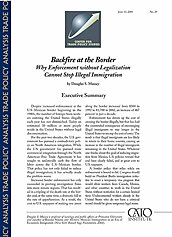Despite increased enforcement at the U.S.-Mexican border beginning in the 1980s, the number of foreign-born workers entering the United States illegally each year has not diminished. Today an estimated 10 million or more people reside in the United States without legal documentation.
For the past two decades, the U.S. government has pursued a contradictory policy on North American integration. While the U.S. government has pursued more commercial integration through the North American Free Trade Agreement, it has sought to unilaterally curb the flow of labor across the U.S.-Mexican border. That policy has not only failed to reduce illegal immigration; it has actually made the problem worse.
Increased border enforcement has only succeeded in pushing immigration flows into more remote regions. That has resulted in a tripling of the death rate at the border and, at the same time, a dramatic fall in the rate of apprehension. As a result, the cost to U.S. taxpayers of making one arrest along the border increased from $300 in 1992 to $1,700 in 2002, an increase of 467 percent in just a decade.
Enforcement has driven up the cost of crossing the border illegally, but that has had the unintended consequence of encouraging illegal immigrants to stay longer in the United States to recoup the cost of entry. The result is that illegal immigrants are less likely to return to their home country, causing an increase in the number of illegal immigrants remaining in the United States. Whatever one thinks about the goal of reducing migration from Mexico, U.S. policies toward that end have clearly failed, and at great cost to U.S. taxpayers.
A border policy that relies solely on enforcement is bound to fail. Congress should build on President Bush’s immigration initiative to enact a temporary visa program that would allow workers from Canada, Mexico, and other countries to work in the United States without restriction for a certain limited time. Undocumented workers already in the United States who do not have a criminal record should be given temporary legal status.
About the Author

This work is licensed under a Creative Commons Attribution-NonCommercial-ShareAlike 4.0 International License.
